Jeopardy and 19th Century Novelists
Here are bunch of 19th century authors taken from listcoholic’s The 100 Best Novels of the 19th Century. We took the list and sorted it by authors, then compared it to the J-Archive to see how many clues and FJs there have been on each author in the last 5 years. Consider the count approximate — sometimes these authors are mentioned in clues but the answer is someone else. So only clues about these authors, their works and characters in their works were mainly counted. And the winner was Mark Twain.
The novels that have the year in parentheses are ones that were on the 100 Best Novels list. The ones without a year were taken from past Jeopardy! clues.
- 47 + 2 FJs – Mark Twain – Adventures of Huckleberry Finn (1885), The Adventures of Tom Sawyer, The Prince and the Pauper, A Connecticut Yankee in King Arthur’s Court, Life on the Mississippi, Pudd’nhead Wilson; lots of quotes; collaborations with Bret Harte and other tidbits about his life.
- 35 + 5 FJs – Jane Austen – Emma (1816), Mansfield Park (1814), Sense and Sensibility (1811), Pride and Prejudice (1813)
- 34 + 1 FJ – Charles Dickens – David Copperfield (1850), A Tale of Two Cities (1859), Bleak House (1853), Great Expectations (1861), Barnaby Rudge, David Copperfield, Little Dorritt, The Mystery of Edwin Drood, Nicholas Nickleby, Oliver Twist, Our Mutual Friend, The Pickwick Papers
- 27 – Henry James – The Portrait of a Lady (1881), Washington Square (1880), The Wings of a Dove, Daisy Miller, Madame de Mauves, The Bostonians, The Turn of the Screw, The Golden Bowl, The Europeans, What Maisie Knew
- 27 – Oscar Wilde – The Picture of Dorian Gray (1890), Lady Windermere’s Fan, The Importance of Being Earnest, A Woman of No Importance; his poem, The Ballad of Reading Gaol; De Profundis, a letter to Lord Alfred Douglas
- 24 + 2 FJs – Edgar Allan Poe – The Narrative of Arthur Gordon Pym of Nantucket (1838), Fall of the House of Usher, The Mystery of Marie Roget, The Pit and the Pendulum, The Gold Bug, The Cask of Amontillado, The Sphinx, The Oblong Box; also material on his poetry, The Raven, The Bells, The Sleeper, The Haunted Palace, Helen, Ulalume,
- 25 + 1 FJ – Jules Verne – Around the World in Eighty Days (1873), Twenty Thousand Leagues Under the Sea (1870), Journey to the Center of the Earth, Five Weeks in a Ballon, Adventures of Captain Hatteras, Paris in the Twentieth Century, From Earth to the Moon, An Antarctic Mystery, Master of the World, The Mysterious Island
- 22 + 2 FJs – Thomas Hardy – Far From the Madding Crowd (1874), Jude the Obscure (1895), Tess of the D’Urbervilles (1891), The Return of the Native, Under the Greenwood Tree, A Pair of Blue Eyes, also clues on novel settings — Wessex
- 19 – H.G. Wells – The War of the Worlds (1898). The Island of Dr. Moreau, The Invisible Man
- 19 – Victor Hugo – Les Miserables (1862), The Hunchback of Notre-Dame (1831), Toilers of the Sea
- 17 – Harriet Beecher Stowe – Uncle Tom’s Cabin (1852)
- 17 – Nathaniel Hawthorne – The Scarlet Letter (1850), The House of the Seven Gables, The Marble Faun, Young Goodman Brown; alma mater, Bowdoin College; friend U.S. Pres. Franklin Pierce; Brooks Farm
- 16 – Sir Walter Scott – Ivanhoe (1819), Waverley (1814), Kenilworth, Rob Roy, clues about Lady of the Lake poem, his birthplace, pseudonyms, too
- 15 – James Fenimore Cooper – The Last of the Mohicans (1826), The Deerslayer, The Pioneers, The Spy, The Leatherstocking Tales
- 14 – Herman Melville – Moby-Dick (1851), Billy Budd, Omoo, Bartleby the Scrivener; his poem, Shiloh, a Requiem, Typee, Redburn, The House of the Seven Gables
- 13 – Arthur Conan Doyle – A Study in Scarlet (1887), The Hound of the Baskervilles, Sherlock Holmes clues and titles
- 11 – George Eliot – Silas Marner (1861), The Mill on the Floss (1860), Middlemarch (1872), Adam Bede, Silas Marner
- 11 – Johann Wolfgang von Goethe – Elective Affinities (1809)
- 10 – Aleksandr Pushkin – Eugene Onegin (1833), Boris Godunuv. Some clues on his heritage, birthplace, manner of death (a duel).
- 9 + 1 FJ – Alexandre Dumas – The Three Musketeers (1844), The Count of Monte Cristo (1846), Joseph Balsamo
- 9 -Mary Shelley – Frankenstein (1818) (also know the book’s subtitle: The Modern Prometheus), Valperga
- 8 – Bram Stoker – Dracula (1897), Lair of the White Worm,
- 7 + 1 FJ – William Thackeray – Vanity Fair (1848), The Newcomes
- 7 – Gustave Flaubert – Bouvard and Pécuchet (1881), Sentimental Education (1869), Madame Bovary (1857)
- 7 – Samuel Butler – Erewhon (1872), The Way of All Flesh
- 6 – Charlotte Brontë – Jane Eyre (1847)
- 6 – Emily Brontë – Wuthering Heights (1847)
- 6 – Leo Tolstoy – War and Peace (1869), Anna Karenina (1877), The Hedgehog and the Fox, Prizms and Metros, Hadji Murat
- 6 – Nikolai Gogol – Dead Souls (1842), Taras Bulba, The Inspector General, Diary of a Madman
- 6 – Wilkie Collins – The Moonstone (1868), The Woman in White (1859)
- 4 – August Strindberg – The Red Room (1879), Miss Julie, Married, The Great Highway
- 4* – Emile Zola – L’Assommoir (1877), Nana (1880), Germinal (1885); *all Zola clues were about his 1898 letter J’Accuse.
- 3 – Anne Bronte – The Tenant of Wildfell Hall (1848), Agnes Grey
- 3 – George Sand – Indiana (1832)
- 3 – Guy de Maupassant – Bel-Ami (1885), Ball of Fat, The Necklace, Pierre et Jean
- 3 – Honoré de Balzac – The Magic Skin (1831), Eugénie Grandet (1833), La Cousine Bette (1846), Le Père Goriot (1835), Les Chouans, Human Comedy (La Comédie humaine) and a clue about the Rodin sculpture of him
- 3 – Ivan Turgenev – Ottsy i Dei, Fathers and Sons (1862)
- 3- Stendhal – The Charterhouse of Parma (1839), The Red and the Black (1830)
- 2 – Anthony Trollope – Barchester Towers (1857), The Last Chronicle of Barset (1867)
- 2 – Fyodor Dostoevsky – Crime and Punishment (1866), Demons (1872), The Brothers Karamazov (1880), The Idiot (1869), The House of the Dead
- 2 – R.D. Blackmore – Lorna Doone (1869)
- 1* – Henryk Sienkiewicz – Quo Vadis (1985) – the clue was on the 1951 movie based on the book
- 1 – Ivan Goncharov – Oblomov (1859) – a reference to Oblomov’s habitual clothing
- 1 – Joris-Karl Huysmans – Against Nature (1884)
- 1- Kate Chopin – The Awakening (1899), A No-Account Creole
Of course, this is not to say that those are the only 19th century authors a player can run into on Jeopardy! There’s Louisa May Alcott and Robert Louis Stevenson pops up a lot for both his novels and his poems and we’re only looking at novelists here. Some, like Dostoevsky, used to get more attention. He had 3 clues in 2007 and 2004 each — that’s more than he’s had for the last 5 years.
We may earn a small commission from qualifying purchases made from Amazon.com links at no cost to our visitors. Learn more: Affiliate Disclosure.

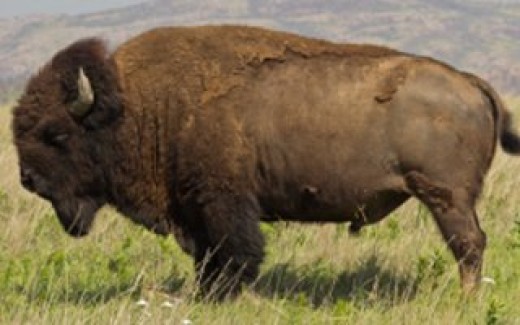
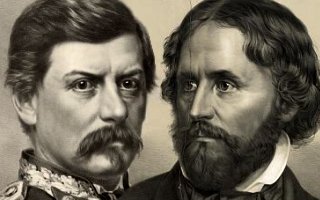
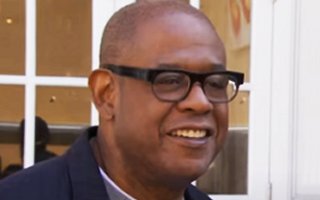

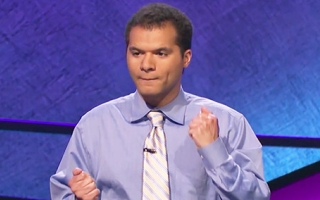
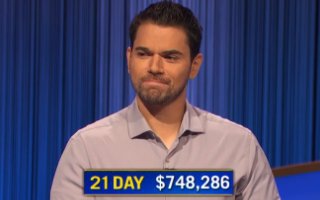
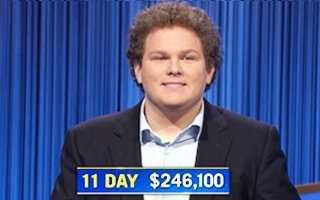
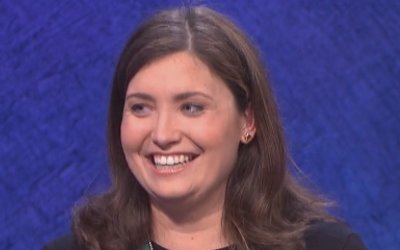
“Never put off until tomorrow what you can put off until the day after tomorrow”, Mark Twain